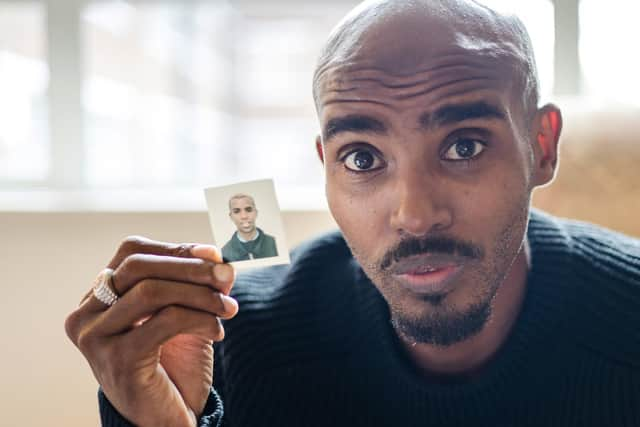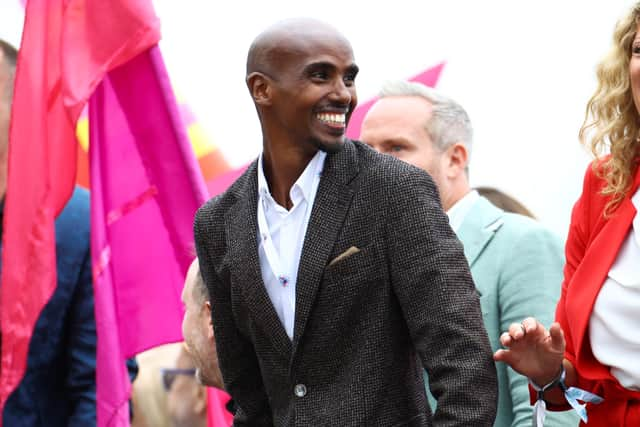Sir Mo Farah: Met Police investigating Olympic legend’s trafficking revelations
and live on Freeview channel 276
The Met Police has said it has opened an investigation into Sir Mo Farah’s revelation that he was trafficked to the UK as a child.
The force says specialist officers will assess information the former Olympic athlete gave in a BBC documentary.


Advertisement
Hide AdAdvertisement
Hide AdSir Mo said he arrived under a false name after escaping war in Somalia.
The quadruple gold medallist explained that he had been trafficked to become a domestic servant for a family in west London.
In a statement, the Metropolitan Police said: "We are aware of reports in the media concerning Sir Mo Farah. No reports have been made to the MPS [Metropolitan Police Service] at this time.
"Specialist officers have opened an investigation and are currently assessing the available information."
Advertisement
Hide AdAdvertisement
Hide AdIn the BBC documentary, The Real Mo Farah, which aired on Wednesday, the athlete expressed concerns that speaking out could cause him to lose the British citizenship he was granted in 2000.
The Home Office has since said no action will be taken against the running legend.


Speaking in the film, Sir Mo said his real name is Hussein Abdi Kahin and that he was born in Somaliland, a breakaway state in Somalia.
He said: “Most people know me as Mo Farah but it’s not my name or it’s not the reality.
Advertisement
Hide AdAdvertisement
Hide Ad“The real story is I was born in Somaliland, north of Somalia, as Hussein Abdi Kahin. Despite what I’ve said in the past, my parents never lived in the UK.
“When I was four my dad was killed in the civil war, you know as a family we were torn apart.
“I was separated from my mother, and I was brought into the UK illegally under the name of another child called Mohamed Farah.”
After his father was killed, his mother sent him to live with his uncle in Djibouti, but, because of the war, she lost contact with them.
Advertisement
Hide AdAdvertisement
Hide AdSir Mo was then later brought to the UK when he was nine with a woman he didn’t know, with the understanding that he was going to stay with a relative.
He recalled going through a UK passport check under the name of Mohamed.
He said: “I had all the contact details for my relative and once we got to her house, the lady took it off me and right in front of me ripped them up and put it in the bin and at that moment I knew I was in trouble.”
The athlete was forced to work as a domestic servant, looking after another family’s children.
Advertisement
Hide AdAdvertisement
Hide AdHe said: “If I wanted food in my mouth, my job was to look after those kids, shower them, cook for them, clean for them, and she said, “If you ever want to see your family again, don’t say anything. If you say anything, they will take you away”.
“So she told [me] “you don’t talk about anything” otherwise I was in big trouble and I guess for me the only thing that I could do, [that was] in my control was to run away from this was get out and run.”
Sir Mo eventually told his PE teacher, Alan Watkinson, the truth and moved to live with his friend’s mum, Kinsi, who “really took great care” of him. He ended up staying with them for seven years.


It was his PE teacher who applied for Sir Mo’s British citizenship – which he described as a “long process” – and on July 25 2000, Sir Mo was recognised as a British citizen.
Advertisement
Hide AdAdvertisement
Hide AdSir Mo, who named his son Hussein after his real identity, said: “I often think about the other Mohamed Farah, the boy whose place I took on that plane and I really hope he’s OK.
“Wherever he is, I carry his name and that could cause problems now for me and my family.
“The important thing is for me to just be able to say “look, this is what’s happened” and just being honest, really.”
The documentary ends with Sir Mo speaking to the real Mohamed Farah whose identity he took entering the UK, before adding that he will continue to go by the name he was given when he entered the UK.
